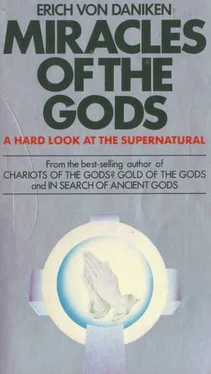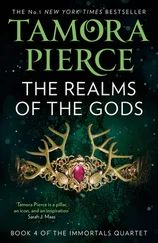Erich Daniken - Miracles of the Gods
Здесь есть возможность читать онлайн «Erich Daniken - Miracles of the Gods» весь текст электронной книги совершенно бесплатно (целиком полную версию без сокращений). В некоторых случаях можно слушать аудио, скачать через торрент в формате fb2 и присутствует краткое содержание. Жанр: Физика, на английском языке. Описание произведения, (предисловие) а так же отзывы посетителей доступны на портале библиотеки ЛибКат.
- Название:Miracles of the Gods
- Автор:
- Жанр:
- Год:неизвестен
- ISBN:нет данных
- Рейтинг книги:4 / 5. Голосов: 1
-
Избранное:Добавить в избранное
- Отзывы:
-
Ваша оценка:
- 80
- 1
- 2
- 3
- 4
- 5
Miracles of the Gods: краткое содержание, описание и аннотация
Предлагаем к чтению аннотацию, описание, краткое содержание или предисловие (зависит от того, что написал сам автор книги «Miracles of the Gods»). Если вы не нашли необходимую информацию о книге — напишите в комментариях, мы постараемся отыскать её.
Miracles of the Gods — читать онлайн бесплатно полную книгу (весь текст) целиком
Ниже представлен текст книги, разбитый по страницам. Система сохранения места последней прочитанной страницы, позволяет с удобством читать онлайн бесплатно книгу «Miracles of the Gods», без необходимости каждый раз заново искать на чём Вы остановились. Поставьте закладку, и сможете в любой момент перейти на страницу, на которой закончили чтение.
Интервал:
Закладка:
The bishops of the Fifth Council had virtually no work to do. Anything that Justinian had in mind had been achieved long before by imperial decrees and laws. It is not unironical to find this assembly described in theological literature as the 'Council of Acclamation'.
Justinian summoned Pope Vigilius (537-555) - 'Unworthy representative of his office', who was later quoted by opponents of papal infallibility to prove their case - to Constantinople. Vigilius and the bishops submitted themselves to the power-political interests of the Emperor, who found a place in the history books because of his pitiless laws against heretics. Henceforth a 'heretic' was anyone who denied the Christian dogmas. He was subject to savage punishments, and even death. An army of Roman officials tracked down dissenters, rounding them up in droves and forcing them to accept Christian baptism on Justinian's orders.
The Byzantine historian Procopius (circa 490-555) was author of a History of Justinian's Wars against the Persians, Vandals and Goths, and a book about Justinian's buildings (Hagia Sophia!), but he also wrote a pamphlet against Justinian and his wife Theodora. Procopius, who presumably knew his noble lord well, described Justinian as proud, hypocritical, unrighteous, malicious, cruel and bloodthirsty.
Christian interpreters of history like to deviate from Procopius's description. Naturally! For Justinian was canonized like the Emperors Constantine and Theodosius.
What happened at the Council?
The Greek ecclesiastical writer. Origen (circa 185-254), a teacher in the catechists' school at Alexandria, was the most important theologian in Christian antiquity and the first advocate of a critical examination of the Bible. With the help of his Platonic training he had to some extent made the scriptures intelligible and spiritualized them by allegorical interpretations. The Council condemned his deviations and said his exegeses were unorthodox. What was to be orthodox in future was exclusively determined by the leaders of the Church, inspired by the Holy Ghost. When this decision was taken by the Council, persecution was not confined to Origen's numerous followers; the view halloo! to hunt all the other dissenters was also sounded.
(About this time the ring which bishops wear became a symbol of 'marriage' to the Church. A strange union, in my opinion, between man and Holy Ghost.)
The Bible is not 'God's word'. Moreover, the dogmas concocted at the first five councils) by an army of princes of the church are not inspired by the Holy Ghost - in spite of the participants' supposed charisma. This comes as a severe shock to the average religious layman, because he is usually unprepared for it. What is left?
What is the truth about Jesus? Did he exist? Did he bleed to death on the Cross for our sins? Did he really preach what is recorded in the New Testament? And if the texts put into the mouth of Jesus are not by him, where did the 1,500 copies of the 'original text' originate from? Something must have happened. One single figure out of many who were crucified could not kindle and support such a colossal cult of personality. Clever heads were at work.
There are thousands of books about Jesus of Nazareth. Versions of the story of Jesus based on the latest research have recently been published by authors such as Johannes Leh-mann [8], Joel Carmichael [9] and Rudolf Augstein [10]. Naturally these critics of misleading interpretations of Jesus are contradicted by the theological party, yet when one analyses the prevarications of the group of authors [11] writing about Augstein's Jesus Menschensohn, one recognizes only the time-honoured technique that Joachim Kahl called 'camouflage'.
Christian theologians make the dogma of Jesus - the established religious doctrine with the claim to unconditional validity, the unproved proposition [12] - the salient point of the Christian religion. Even that seems understandable, if rash, to me, because the hundreds of thousands of pastors of all the Christian churches would lose their jobs and their personal raison d'etre if they could no longer act in the name of Jesus. To be honest they would have to say to the little man in the seventeenth row of the Jesus of Nazareth was not 'God's only begotten son' and that he himself never pretended that he was.
In fact, it would be asking a lot to expect such a pronouncement from the pulpit. What then was the real Jesus like?
Rudolf Augstein [13] asks: '... with what right do the Christian churches refer to a Jesus who did not exist in the form they claim, to doctrines which he did not teach to an absolute authority which he did not confer and to an affiliation with God which he never laid claim to.'
These are no novelties to the initiated, but I am addressing the ignorant, the laymen, who neither know nor understand theological double-Dutch. Once again, I am taking it on my broad back to translate professorial wisdom into generally intelligible language - knowing perfectly well what a sound thrashing by Christian specialists awaits me. It is not in my nature simply to believe 'par ordre du mufti'.
The wisdom of theologians has been printed in hundreds of thousands of books which can be found in archives and libraries. So that everyone can understand me, I must begin at the beginning.
For nearly two thousand years now the Christian has been given an unbearable burden to carry on his way through life: he is inflicted with original sin from birth and he needs the 'Redeemer' to free himself from it.
We all learnt in school and church that God was the beginning and end of everything, alpha and omega, that God was almighty, infinitely good, all-righteous, omniscient, omnipresent and eternal.
So far I accept the concept of God without reservations. But because he is eternal God is also timeless: he knows no yesterday, today or tomorrow. Eternal and omnipresent God does not need to await the results of his measures. He does not need to ask how they are going to turn out, for he already knows the answer.
In my Catholic school I listened attentively to the charming story of how God in his goodness made two harmless creatures a present of a stay in Paradise, the home of joy and happiness. Adam and Eve, the chosen ones, lived a carefree-existence. They lacked nothing and they had no desires or longings.
There was only one thing that was strictly forbidden them by God the Father. They must not eat of the Tree of Knowledge. It was the first case of 'Off limits'!
We are nonplussed. Why did the Almighty make this strict prohibition? Did he enjoy this kindergarten for the first people on earth? Could God share the human happiness which Adam and Eve experienced in the Garden of Eden, since he, the sublime, stood high above mankind? Why did he want to keep
'knowledge' from his first-created children?
Theologians have an answer. God wanted to 'bestow love' on them and wished that they should both
'partake' of his kingdom. For heavens' sake! According to that interpretation. God is supposed to have yearned for love ... and to have felt lonely. In my opinion, those are not feelings that befit God, for he of all people is boundlessly happy in his omnipotence. An intermediate condition - 'A little love might be nice' or 'It's boring, playmates wouldn't be a bad idea' - does not exist for an exclusive God. So what was he trying to achieve with his humans in Paradise?
Again, theologians have the answer pat. God wanted to lead Adam and Eve into temptation, he wanted to test them. That doesn't wash, reverend gentlemen. What kind of low opinion have they of God?
'Temptation and 'testing' would be mere cardsharper's tricks, since he, the omniscient, must have known the results of the temptation beforehand. Now suppose we play with the idea that they did not, having free will, eat the apple. What would have happened if they had not recognized their shameful nakedness - and with it the possibility of procreation? Would God have had to create more and more human beings - on the assembly-line system? People, who, thanks to their free will, would not have striven for 'knowledge', because they obediently observed God's ban? God obviously had the 'Fall' in his calculations, because he was omniscient. Otherwise many countries in the world would not be bursting at the seams with overpopulation today.
Читать дальшеИнтервал:
Закладка:
Похожие книги на «Miracles of the Gods»
Представляем Вашему вниманию похожие книги на «Miracles of the Gods» списком для выбора. Мы отобрали схожую по названию и смыслу литературу в надежде предоставить читателям больше вариантов отыскать новые, интересные, ещё непрочитанные произведения.
Обсуждение, отзывы о книге «Miracles of the Gods» и просто собственные мнения читателей. Оставьте ваши комментарии, напишите, что Вы думаете о произведении, его смысле или главных героях. Укажите что конкретно понравилось, а что нет, и почему Вы так считаете.











